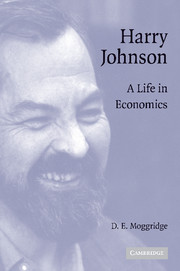Book contents
- Frontmatter
- Contents
- Photographs and Drawings
- HARRY JOHNSON
- Introduction
- 1 Toronto
- 2 Antigonish
- 3 England
- 4 North American Postgraduate
- 5 Cambridge Don
- 6 Cambridge Economist
- 7 Manchester
- 8 Chicago
- 9 Canada, Economic Nationalism, and Opulence, 1957–1966
- 10 Chicago: Money, Trade, and Development
- 11 LSE
- 12 Professional Life – Largely British
- 13 Money and Inflation
- 14 The International Monetary System
- 15 Harry's “Wicksell Period”
- 16 Stroke and After
- 17 Conclusion
- Sources
- Index
- Plate section
15 - Harry's “Wicksell Period”
Published online by Cambridge University Press: 04 December 2009
- Frontmatter
- Contents
- Photographs and Drawings
- HARRY JOHNSON
- Introduction
- 1 Toronto
- 2 Antigonish
- 3 England
- 4 North American Postgraduate
- 5 Cambridge Don
- 6 Cambridge Economist
- 7 Manchester
- 8 Chicago
- 9 Canada, Economic Nationalism, and Opulence, 1957–1966
- 10 Chicago: Money, Trade, and Development
- 11 LSE
- 12 Professional Life – Largely British
- 13 Money and Inflation
- 14 The International Monetary System
- 15 Harry's “Wicksell Period”
- 16 Stroke and After
- 17 Conclusion
- Sources
- Index
- Plate section
Summary
In the years before he went to LSE, Harry financed some of his activities through a grant from the Rockefeller Foundation. The topic of the research was very general – international trade and technical change. The major expenditure under the grant was for a research assistant, Herbert G. Grubel. Most of Harry's own work on tariff structures, effective protection, economic nationalism, and protectionism has already been discussed. However one of the last topics Harry touched on was the international migration of highly skilled people, which he had first addressed in “The Economics of the Brain Drain” at the sixth Seminar in Canadian–American Economic Relations at the University of Windsor in 1964, a paper which he reprinted in Minerva (1965c). Harry encouraged Grubel and Anthony Scott, who was visiting Chicago as Lilly Fellow in 1965 to collaborate on such questions, and the result for them was a series of papers and eventually a monograph.
Although he continued to contribute to other areas of international trade theory during his LSE period, Harry's thinking took on a new twist – one so distinctive that Max Corden called it “Harry's ‘Wicksell Period’” (1984, 580). The reference is to his Wicksell Lectures delivered in Stockholm in March 1968, Comparative Cost and Commercial Policy Theory for a Developing World Economy (1968h). Harry described the orientation of his ‘Wicksell Period’ to his chair, A. C. Harberger, in June 1968:
I am presently engaged on a major project which will take some years. It is more an effort at improving my own ability to teach relevant economics to my students, and express it in my writings on current topics of theory and policy, than something that will result in a major research monograph or series of monographs.[…]
- Type
- Chapter
- Information
- Harry JohnsonA Life in Economics, pp. 378 - 392Publisher: Cambridge University PressPrint publication year: 2008



